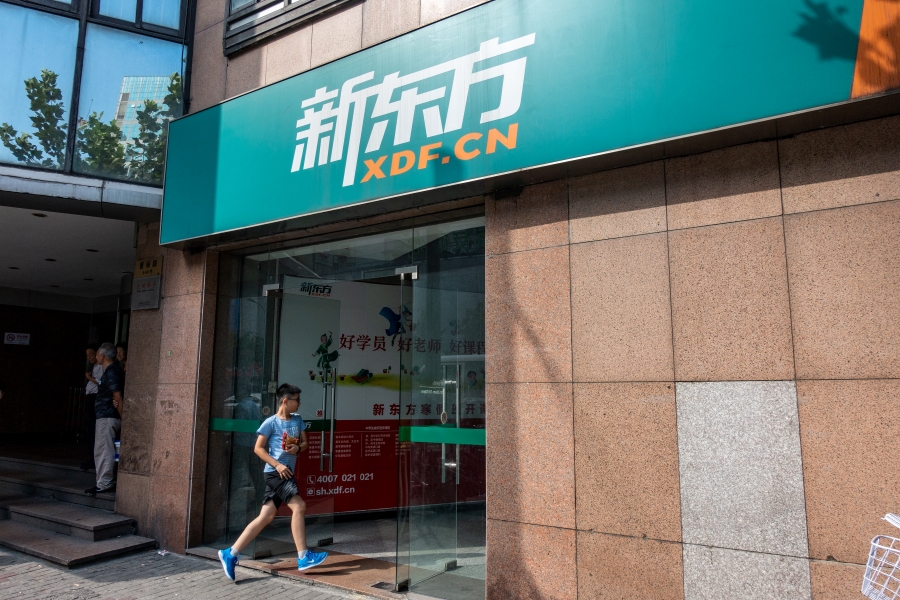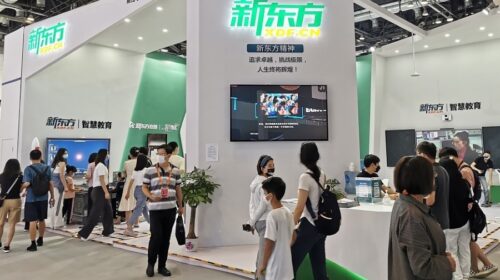New Oriental Education Records Huge Loss, But Forges Ahead

China’s former leading private educator has revealed the huge costs it incurred in its first earnings report since a major industry reshuffle
Key takeaways:
- New Oriental fell deeply into the red in its latest six-month reporting period after incurring massive costs from suspending its K-9 instruction business
- Founder Yu Minhong said he is determined to defy all odds and chart a path forward by developing new businesses
By Jony Ho
The second half of 2022 was an instructive time for New Oriental Education & Technology Group Inc. (EDU.US; 9901.US), even though China’s leading private educator would probably rather forget that period.
New Oriental isn’t alone in feeling the pain that has crippled China’s entire extracurricular education sector since Beijing introduced a “double reduction” policy to reduce the homework burden on students. The policy shift has put many companies out of business, and forced the ones still standing to pivot away from the extracurricular classes in many areas that are now largely banned.
The magnitude of the growing pain was on display in New Oriental’s interim financial report through last November, representing the first period after the policy was implemented. Those results don’t hold any big surprises. The company tumbled into the red big time, and saw its cash flow shrink by 60%, even as the report failed to fully capture the impact of the company’s woes. The market was looking for signs on the state of the industry and New Oriental’s own future plans, though the report contained little in that regard.
New Oriental netted a loss of $876 million during the six-month period through November, compared with a $228 million profit in the same period of 2020, mainly as a result of suspending multiple rental contracts and massive layoff-associated expenses. Its loss was near the higher end of the estimated loss range it gave in January, when it warned of a loss between $800 million to $900 million.
The company’s U.S.-listed shares fell 10% during pre-market trade on Monday after the report’s release, but then rallied a bit. By the end of the trading day, the decline narrowed to 1.32% and the stock was trading at $1.50. On Tuesday, the price for its concurrently Hong Kong-listed shares surged, reaching HK$11.82 by midday with a rise of 6.1%. But the stock in both markets is still down by more than 90% from its 2021 highs in a happier time.
Its price-to-book (P/B) ratio of around 0.51 times is slightly better than the 0.48 times for TAL Education Group (TAL.US), but much lower than 0.93 times for Gaotu Techedu (GOTU.US) and 1.3 times for OneSmart International Education Group (ONE.US). That suggests the market is more concerned about New Oriental’s prospects than some of the others that are still in business.
The simple eight-page report for its latest six-month period shows the company’s revenue increased 5% year-on-year to $1.97 billion, mostly due to the fact that it continued to offer K-9 education services for part of the period before the policy took effect. But those services have since been shut down, meaning the impact will be on full display in the next report.
Big expenses
More noteworthy in the latest report are the company’s expenses. Founder and Chairman Yu said last month the company had let go 60,000 workers and was on the hook for nearly 20 billion yuan in severance pay, employee compensation and costs related to ending rental contracts before their expiry dates. Part of the expense was reflected in the latest financial report, manifest as a 120% increase in administrative costs to $1.29 billion, representing a year-on-year increase equivalent to around 4.5 billion yuan. But more than 15 billion yuan in cleanup costs have yet to be reflected.
The company’s cash flow is also noteworthy. Following the big jump in expenses, its net outflow of operating cash during the six-month period reached $1.07 billion. Its cash and cash equivalents fell to $1.05 billion, down 60.4% from $2.65 billion in the previous year. Such figures show just how weak the company has become.
New Oriental did not hold any earnings call or press conference after the report’s release. The only discussion of its future in the report said it would re-pivot to non-K-9 education products and services like adult language instruction, and that it would actively explore other business opportunities.
New Oriental and its peers have chosen different paths following release of the document from China’s State Council aimed at reducing the burden of excessive homework and extracurricular classes on K-9 students. OneSmart simply folded and suspended most of its operations last October. Rise Education (REDU.US) is planning to transfer a big part of its assets to a private corporation. So, why is Yu still determined to forge ahead with a transition he hopes will see New Oriental come out better on the other side?
Yu said some of his friends had suggested closing the company, but he emphatically decided against that because, as the head of the company, he was responsible for the livelihood of the more than 50,000 people who were still on its payroll. He said on social media Monday that the company had held eight internal business meetings to discuss different aspects of its operations and try to chart a path forward.
He said some new business operations are already up and running, and some are even showing results. He said the people of New Oriental have the courage to never call it quits or surrender in the face of great difficulties, and he believes his company can continue to prosper with everyone committed to a joint cause.
His talk isn’t just empty words. To survive, the company has been pulling out all the stops, including livestreaming to sell things that have nothing to do with education. His debut in that realm came last Dec. 28 when he sat in a livestreaming studio and peddled flour, apples and cherries to anyone who would listen. More than 1.87 million people watched that session, which produced 4.9 million yuan in sales.
Faltering e-commerce livestream
Seizing on the positive livestreaming results, the company jointly established an e-commerce platform with its subsidiary Koolearn Technology (1797.HK), which organized 26 livestreaming sessions. But that effort only scored 4.55 million yuan in sales, lower than what Yu personally generated in just a single session. That raises doubts about the new business’ sustainability without Yu’s personal involvement.
Koolearn, which felt a similar big pinch from the new policy, also published its own interim financials the same day as New Oriental’s, including a 540 million yuan loss and a 15.3% revenue decline to 570 million yuan, mostly due to the shutdown of its K-9 business.
New Oriental is looking into other areas as well. The company founded 89 new companies in the six months through January this year, covering a wide range of businesses including retail, AI and even movies and arts. It has even ventured into the semiconductor sector that has been all the rage these last few years.
That foray saw media report the company had established a semiconductor manufacturing business with investments in the design, sale and manufacturing of integrated circuits. Such a move might seem a bit far outside the company’s natural comfort zone. But with China going all-out to develop the domestic semiconductor sector, and given the company’s heft and clout, it has a decent shot at securing generous government subsidies.
If nothing else, the company is certainly casting a wide net to try out various future business paths. Whether such a bold move will deliver, and how much, remains to be seen, though management should be praised for its willingness to open up new frontiers. We may even start to see some results of those efforts more clearly in the company’s next financial report.
To subscribe to Bamboo Works free weekly newsletter, click here




